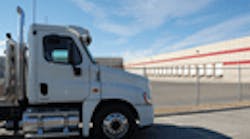While motor carriers appear ready to replace their aging fleets, they have less appetite to expand their fleet capacity, according to the Business Expectation Survey for the fourth quarter of 2010 from Transport Capital Partners, LLC (TCP). Fewer fleets are planning capacity increases than a quarter ago, with 41% saying they have no plans to add capacity, up from 34% last quarter, noted Richard Mikes, TCP partner. A quarter of the carriers surveyed plan to add only 1 to 5%.
“Carriers have stifled expansion appetites because of increased equipment costs, looming driver shortages, and poor financial returns,” Mikes said. “These acquisition plans are principally replacements for aging fleets, but expected freight volume increases have acquisition plans ramping up modestly.”
Carriers did indeed report plans for higher acquisition rates. Forty percent surveyed this quarter said they would acquire or replace more than 10% of their fleet compared to only 30% in the last survey. “Most carriers have not purchased new equipment for some time and the pool of used equipment has been diminished by exports and scrapage [sic], while fleet utility is picking up,” noted Lana Batts, TCP Partner.
Patrick Quinn, president and co-chairman of U.S. Xpress Enterprises, Inc., told Fleet Owner that U.S. Xpress is among those fleets sticking to replacement-only equipment purchases for now. “We are replacing trucks, but not adding trucks,” he said. “Nobody is adding more trucks. The feeling is that with capacity tightening, carriers may be able to recover some of the rate territory [they lost during the recession.] Even with the economy growing just two to two and a half percent, that puts a lot more freight out there. We certainly saw it in May and June.
“It also costs a lot to replace a tractor,” Quinn added. “When you trade-in a 2006-2007 tractor for a 2011 tractor, it takes an additional $30,000 to $35,000 more for the new model. To add a new tractor and three new trailers would cost about $195,000. Carriers just can’t do that because the rate of return isn’t there right now. The downside is that holding trucks longer starts driving maintenance costs through the roof.”
Uncertainty about what the future holds is also keeping the lid on equipment buying plans, according to Quinn. “There are so many unknowns,” he said. “We don’t know what the impact of CSA will really be on carriers over time. We don’t know what hours of service [reform] will look like yet. Changes to hours of service will have a chilling effect, even if there is a lawsuit. It just creates too much uncertainty.”
Taxes and health care costs are two more unknowns putting downward pressure on equipment purchasing plans, Quinn noted. “We have 8,500 employees,” he told Fleet Owner, “and we don’t have a good sense for what the government-mandated health care programs will cost us. We don’t even know what taxes will look like yet.”
Like U.S. Xpress, Jet Express has kept new truck purchases to a minimum and plans to continue to focus on just replacing older equipment, according to Jeff Davis, vp of safety for Jet Express. “We have made some replacements,” he told Fleet Owner, “but we run our trucks longer anyway because we are a regional operation. We’ve also experimented with putting glider kits on a couple of pre-2008 chassis to see how that works for us”
Jimmy Ray, vp of Mesilla Valley Transportation, also reports no plans to expand capacity in the immediate future. “We will be trading trucks in 2011, but we will not be adding trucks,” he told Fleet Owner. “The driver shortage is creeping up on us again and CSA will make it even tougher.”
“We have definitely pushed out trade cycles, but that has to change. We can’t go on like this much longer,” Larry Ahlers, vp of transportation for Oldcastle Architectural, Inc., told Fleet Owner. “There is some sticker shock though when it comes to buying new equipment, mostly related to the new emissions standards. That makes it hard to spend [money on new vehicles].
“We are doing some buying, but we are doing it very cautiously,” Ahlers continued. “We are being very selective about what we replace. Right now, it is just too risky to buy a large number of trucks [until the new emissions reduction systems and engines] have had some time on the road--- until they are actually proven.”
The uncertainties just keep stacking up, creating a very real barrier to adding capacity, according to these fleets and many others. Until the new trucks prove their worth, until the long-term impacts of CSA are clear, until Congress makes up its mind about taxes and fleets know the costs tied to the new health care system, until the driver shortage is under control, until hours of service rules are finally set and until rates have gone back up, wary fleets will play it safe when it comes to buying new equipment.
A feature article by Wendy Leavitt on this topic will run in the January print edition of FleetOwner.



